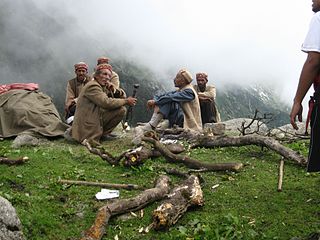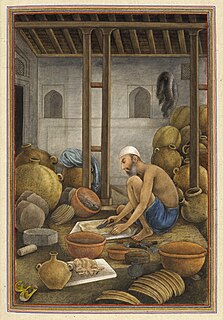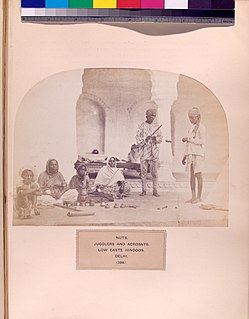Related Research Articles

The Gaddi is a semi-pastoral Indo-Aryan ethno-linguistic tribe living mainly in the Indian states of Himachal Pradesh and Jammu and Kashmir.
The Majhwar are a Scheduled Caste found in the state of Uttar Pradesh in India.

Chamar is a Dalit community classified as a Scheduled Caste under modern India's system of affirmative action. Historically subject to untouchability, they were traditionally outside the Hindu ritual ranking system of castes known as varna. They are found throughout the Indian subcontinent, mainly in the northern states of India and in Pakistan and Nepal.

The Korwa people are a Munda ethnic group of India. They live mainly on the border between Chhattisgarh and Jharkhand. A small number of Korwa are also found in the Mirzapur district of Uttar Pradesh.
The Sahariya are a community found in the Bundelkhand region of North India, which is administered by the states of Madhya Pradesh and Uttar Pradesh. They are also known as Rawat, Banrawat, Banrakha and Soarain.
The Lal Begi, or Lalbegi, are a Chuhra caste found in the states of Bihar and Uttar Pradesh in India, as well as in Multan, Dera Ghazi Khan and Bahawalpur in Pakistan. The Muslim branch of the Lal Begi are known as Hasnati and the Hindu branch as Kayastha (sometime) or Balmiki which are different from Kayastha community who also uses it as there surname.

The Chero is a caste found in the states of Bihar, Jharkhand and Uttar Pradesh in India.
The Parahiya are a Hindu caste found in the state of Uttar Pradesh in North India.

The Nat are a Hindu caste found in northern India.
The Bansphor are a Hindu caste found in the state of Uttar Pradesh, India.
The Domar are a Hindu caste found in the state of Karnataka in India.

The Badhik, or sometimes pronounced Badhak a Hindu caste engages in the profession of butcher are found in the states of Uttar Pradesh, Rajasthan and Haryana in India. They have been granted scheduled caste status in Uttar Pradesh.
The Bedia are a community in India. They believe that they originally lived on Mohdipahar and have descended from the union of Vedbansi prince with a Munda girl. The other view is that a section of the Kudmis were outcastes and came to be known as the Bedia or Wandering Kudmis.
The Bhantu are a Hindu caste found in Uttar Pradesh, where they have scheduled caste status. They are one of the many nomadic groups in found in North India.
The Ghasiya, or sometimes pronounced Ghasia are a Hindu caste found in the state of Uttar Pradesh in India. They are also known as Ghasiara and have Scheduled Caste status.
The Habura are a Hindu caste found in the state of Uttar Pradesh, India.
The Kalabaz are a Hindu caste found in the state of Uttar Pradesh in India. They have Scheduled Caste status.
The Kapasiya are Hindu caste found in the state of Uttar Pradesh and haryana in India. They are also known as Khunkhuniya Bhatt comes in Gurjar caste.
The Patari are a community found mainly in the Sonbhadra district of Uttar Pradesh, India.
The Bajgi are a Hindu caste found in the states of Uttar Pradesh and Uttarakhand in India. They have been granted Scheduled Caste status in both these states. The Bajgi are also known as Auji, Das, Jhumarya and Dholi.
References
- ↑ "Census of India - Tables on Individual Scheduled Castes (SC) and Scheduled Tribes (ST)". Archived from the original on 5 June 2010. Retrieved 27 November 2012.
- ↑ "A-10 Individual Scheduled Caste Primary Census Abstract Data and its Appendix - Uttar Pradesh". Registrar General & Census Commissioner, India. Retrieved 6 February 2017.